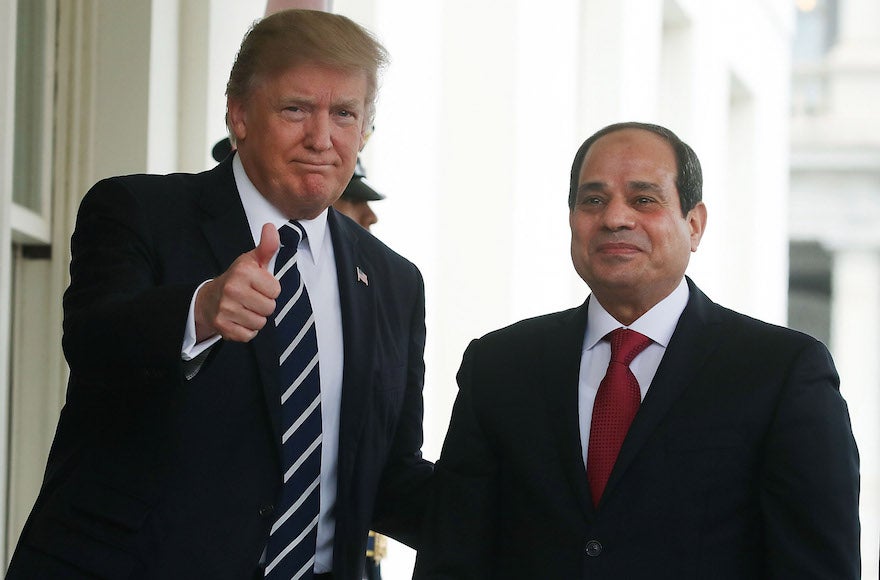WASHINGTON (JTA) — Egyptian President Abdel Fattah el-Sisi expressed guarded optimism about peace between Arabs and Israel, but also warned of the threat posed by Islamists, in a meeting with U.S. foreign policy experts that included Jewish organizational officials.
Sisi met Wednesday morning at the Four Seasons hotel in Washington, D.C., with an array of some 65 guests, attendees said, including representatives of think tanks that focus on the Middle East, informal advisers to President Donald Trump and representatives of an array of Jewish groups.
“He said the atmosphere is more primed now for peace than it was 40 years ago when Sadat made peace,” said Ezra Friedlander, the CEO of a consulting firm who is garnering support in Congress for Anwar Sadat, the Egyptian leader who in 1979 signed the first peace accord with Israel, to receive the Congressional Gold Medal.
Another attendee who asked not to be named said Sisi praised Trump, with whom he met earlier in the week, for seeking to revive Israeli-Palestinian peace negotiations, but cautioned against rushing the talks.
Trump has made Middle East peacemaking a priority, meeting at the White House in February with Israeli Prime Minister Benjamin Netanyahu and this week with Sisi and King Abdullah of Jordan.
“I’m working very, very hard on trying to finally create peace between the Palestinians and Israel, and I think we’ll be successful,” Trump told Abdullah at their meeting Wednesday. Later this month, Trump is due to meet with Palestinian Authority President Mahmoud Abbas.
Trump’s envoy to the region, Jason Greenblatt, has completed a round of talks there and is emphasizing accelerated economic recovery for Palestinians in the Gaza Strip and the West Bank as a means of restarting talks. He is also asking Israel to slow down settlement building.
Sisi at the meeting also called for a bid to roll back Iranian influence in the region but cautioned against elevating tensions with the Islamic Republic to a military conflict, saying that would be disastrous.
His overall emphasis was on confronting Islamist militants in the region, in particular groups like the Islamic State, which has established a foothold in the Sinai, and he praised Trump’s renewed emphasis on combating the phenomenon.
In his White House appearance with Trump earlier in the week, Sisi was lavish with his praise.
“I’ve had a deep appreciation and admiration of your unique personality, especially as you are standing very strong in the counterterrorism field to counter this evil ideology that is claiming innocent lives, that is bringing devastation to communities and nations, and that is terrorizing innocent people,” Sisi told the president.
Jason Isaacson, the American Jewish Committee’s director of international affairs, who was present at the Wednesday breakfast meeting, said Sisi is focused on preserving ties with a critical ally.
“President Sisi’s pursuit of closer alignment with the United States and his commitment to robust strategic cooperation with Israel are matters of record – and were key themes of his visit to Washington,” Isaacson told JTA.
“AJC last met with President Sisi and ministers of his government in Cairo in December – and this week in Washington, as always, it was encouraging to engage with him and his delegation on ways to deepen both the Egyptian-U.S. and Egyptian-Israeli relationships, advance regional and global security, and assure stability and economic progress in a country that has been an essential Arab partner for decades,” Isaacson said.
The American Israel Public Affairs Committee also was present at the meeting, first reported by Jewish Insider, represented by its president, Lillian Pinkus, and Jeff Snyder, a board member.
“We very much appreciated the opportunity to hear President Sisi’s views about the challenges and opportunities in the region,” said the lobby’s spokesman, Marshall Wittman.
Also present at the breakfast meeting were representatives of the Anti-Defamation League, the Conference of Presidents of Major American Jewish Organizations, the Jewish Institute for National Security Affairs and J Street. Think tanks including the Washington Institute for Near East Policy, the Council on Foreign Relations and the Center for Security Policy were on hand as well, as was Rudy Giuliani, the former New York mayor who has advised Trump on security issues.
JTA has documented Jewish history in real-time for over a century. Keep our journalism strong by joining us in supporting independent, award-winning reporting.






